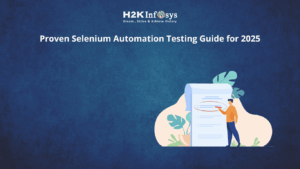Introduction: Why TestNG Is Crucial in Selenium Automation
Automation testing has revolutionized software development, but without the right framework, even the best scripts can become unmanageable. That’s where TestNG comes in. For anyone pursuing a Selenium certification or enrolled in a Selenium training online, mastering TestNG is essential. TestNG empowers testers to create structured, maintainable, and scalable test cases. If you’re considering a Selenium course or already taking an online Selenium course, this guide will show you how to integrate TestNG for Automation and enhance your test automation strategy.
In this detailed guide, we will explore how TestNG for Automation supports efficient test execution, error handling, reporting, and integration with other tools. With real-world applications and hands-on practices, we will help you master the features that make TestNG an industry standard.
What is TestNG?
TestNG stands for “Test Next Generation” and is an open-source testing framework inspired by JUnit. It brings powerful features that support:
- Parallel test execution
- Data-driven testing
- Grouping and prioritization
- Detailed HTML reports
- Easy integration with build tools like Maven and CI tools like Jenkins
It’s built specifically for Java and works seamlessly with Selenium WebDriver, making it a top choice in TestNG for Automation projects. With this tool, automation engineers can write more readable, maintainable, and reusable test scripts.
Why TestNG for Selenium?
1. Structured Testing
TestNG for Automation allows testers to define the structure of test cases clearly. With annotations like @BeforeMethod, @AfterMethod, @Test, and @DataProvider, the code remains clean, readable, and easy to manage. This structure ensures consistency across large-scale test suites.
2. Prioritization and Grouping
You can prioritize test cases and group them logically to enhance test planning and execution efficiency:
@Test(priority=1)
public void loginTest() {
// code to test login
}
@Test(priority=2, groups = {"smoke"})
public void searchTest() {
// code to test search feature
}With TestNG for Automation, managing critical tests during regression cycles becomes seamless.
3. Parallel Execution
Running multiple tests simultaneously can save time and improve efficiency. TestNG for Automation allows parallel execution using its XML configuration, ensuring faster feedback in CI/CD environments.
4. Customizable HTML Reports
TestNG for Automation generates detailed and visually structured HTML reports that include pass/fail status, execution time, screenshots, and custom logs. These reports enhance communication with stakeholders and assist in debugging failed tests.

Setting Up TestNG with Selenium: Step-by-Step Guide
Step 1: Install TestNG in Eclipse
- Go to Eclipse Marketplace > Search “TestNG”
- Install and restart Eclipse
Step 2: Create a Selenium Project with TestNG
public class LoginTest {
WebDriver driver;
@BeforeMethod
public void setup() {
driver = new ChromeDriver();
driver.get("https://example.com/login");
}
@Test
public void loginValidUser() {
driver.findElement(By.id("username")).sendKeys("user");
driver.findElement(By.id("password")).sendKeys("pass");
driver.findElement(By.id("login")).click();
}
@AfterMethod
public void teardown() {
driver.quit();
}
}This is a basic login script built using TestNG for Automation principles.
Step 3: Create TestNG XML
<!DOCTYPE suite SYSTEM "https://testng.org/testng-1.0.dtd">
<suite name="AllTests">
<test name="LoginTests">
<classes>
<class name="com.h2kinfosys.tests.LoginTest"/>
</classes>
</test>
</suite>Run this XML file to execute your tests using TestNG for Automation and organize your test suites for better modularity.
Advanced Features of TestNG for Selenium Testers
1. DataProvider for Data-Driven Testing
@DataProvider(name="loginData")
public Object[][] getData() {
return new Object[][] {
{"user1", "pass1"},
{"user2", "pass2"}
};
}
@Test(dataProvider="loginData")
public void loginTest(String username, String password) {
driver.findElement(By.id("username")).sendKeys(username);
driver.findElement(By.id("password")).sendKeys(password);
driver.findElement(By.id("login")).click();
}This feature makes TestNG for Automation ideal for testing scenarios with multiple input values.
2. Retry Mechanism
TestNG for Automation supports retry logic for failed tests using listeners. You can define a retry analyzer class to automatically re-run failed tests, increasing test reliability.
3. Dependency Management
@Test(dependsOnMethods = {"loginTest"})
public void dashboardTest() {
// Executed only if loginTest passes
}With TestNG for Automation, you can define dependencies between test methods, allowing more intelligent execution flow.
4. TestNG Listeners
Listeners help track test execution and allow additional actions, like taking screenshots on failure or logging status to external systems. TestNG for Automation provides interfaces like ITestListener and ISuiteListener for custom behavior.
Real-World Use Cases
Use Case 1: E-commerce Website Testing
TestNG for Automation helps in running tests for login, product search, cart update, and checkout functionalities with precise control and grouping. QA teams can organize scenarios based on modules and priorities for high coverage.
Use Case 2: Regression Suites
Teams can schedule TestNG XML suites using Jenkins to run nightly regression tests and receive reports automatically. TestNG for Automation ensures consistency in large test suites by supporting flexible test execution and reporting.
Integration with Tools and CI/CD Pipelines
TestNG for Automation can be integrated with:
- Maven: Manage dependencies, build lifecycle, and project configuration
- Jenkins: Schedule jobs, configure builds, and trigger automated test suites
- Extent Reports: Add rich graphical interfaces to your HTML reports
With these integrations, TestNG for Automation and Selenium training align perfectly with real-world DevOps workflows, enabling smooth, continuous testing pipelines.
Common Challenges and Solutions
| Challenge | Solution |
| Tests fail randomly | Use retry analyzers and stabilize environments |
| Reports lack detail | Integrate with ExtentReports or Allure |
| Long execution time | Use parallel execution with suites |
| Complex test management | Use grouping, priorities, and dependencies |
Best Practices for TestNG in Selenium
- Always isolate test cases to avoid interdependencies
- Use DataProvider for reusability and efficient test coverage
- Leverage annotations to structure test logic systematically
- Integrate TestNG for Automation with CI/CD tools for seamless deployment cycles
- Apply strong assertion logic to verify outcomes with clarity
Why Choose H2K Infosys for Selenium Training?
H2K Infosys offers comprehensive Selenium certification courses that include:
- Hands-on projects with TestNG for Automation to simulate real-world tasks
- Real-world automation scenarios like e-commerce, banking, and healthcare systems
- Access to recorded and live Selenium training online sessions
- Industry-aligned curriculum built by QA professionals
- Placement assistance and career guidance for job-ready training
Whether you’re taking your first steps or aiming to validate your skills through a Selenium certification, H2K Infosys has you covered with an online Selenium course that delivers practical value through applied learning.
Conclusion
Mastering TestNG for Automation enhances your Selenium automation skills and boosts your career potential. From parallel execution to structured testing and CI/CD integration, it is an indispensable tool. Take your automation career to the next level by enrolling in a Selenium certification course at H2K Infosys.
Ready to automate smarter? Join H2K Infosys today for expert-led Selenium training and hands-on TestNG for Automation practice.
Key Takeaways
- TestNG for Automation improves efficiency, structure, and scalability of Selenium tests.
- Features like parallel testing, DataProviders, and listeners offer professional-level control.
- Integration with tools like Maven and Jenkins makes it DevOps-friendly.
- H2K Infosys provides hands-on, real-world Selenium training to make you job-ready.

























